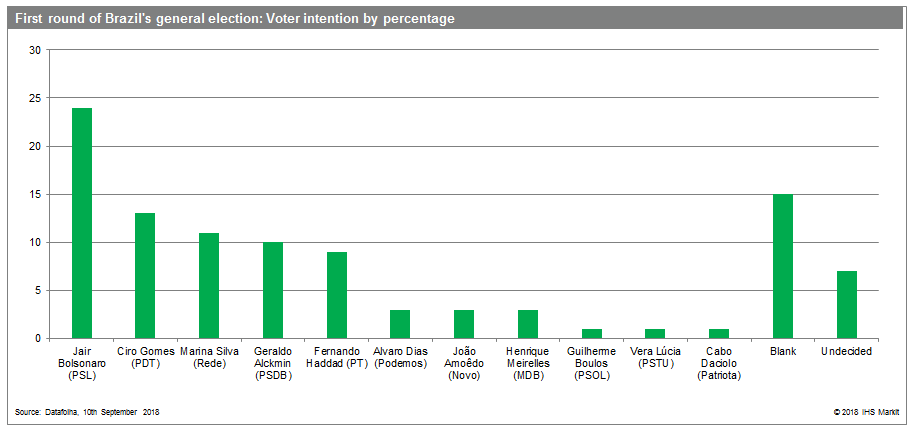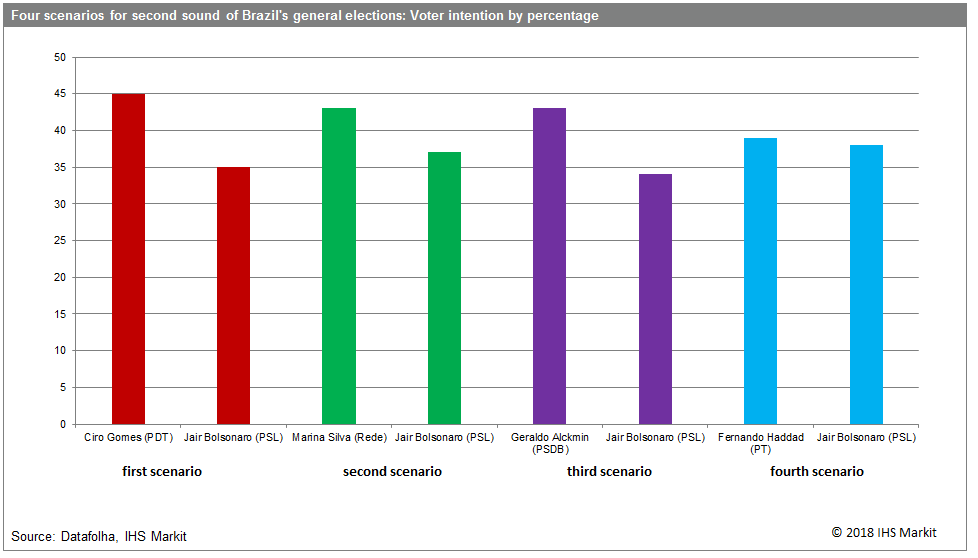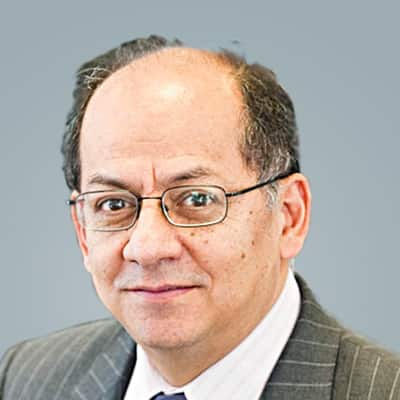Customer Logins
Obtain the data you need to make the most informed decisions by accessing our extensive portfolio of information, analytics, and expertise. Sign in to the product or service center of your choice.
Customer Logins
BLOG
Sep 13, 2018
Brazilian election update
The latest Brazilian opinion polls indicates that the attempt on presidential candidate Jair Bolsonaro's life has increased his support, making it highly likely he will secure a slot in the second round of the presidential election.
- Ciro Gomes and Marina Silva, both from the left, appeared technically level: if this persists each also has a real prospect of reaching the second round. Business-friendly Geraldo Alckmin is at most risk of losing votes to Jair Bolsonaro, while Fernando Haddad of the left-wing Workers' Party (Partido dos Trabalhadores: PT) has scope to gain support thanks to the endorsement of popular former president Luiz Inácio Lula da Silva.
- Bolsonaro is enjoying popular momentum and it now appears highly likely that he will win a place in the second round: with voters deserting mainstream parties the likelihood of an anti-establishment candidate gaining office has increased considerably.
With less than four weeks to go, the Brazilian presidential election remains highly unpredictable. Prospects have become more uncertain following the stabbing of front-running far-right candidate Jair Bolsonaro, from the Social Liberal Party (Partido Social Liberal: PSL), on 6 September 2018. The incident has increased Bolsonaro's presidential chances while reducing the likelihood that a pro-business candidate will be elected president in October.
Sympathy effect increasing Bolsonaro's chances of reaching the second round
Support for Bolsonaro has averaged 20% over the past 12 months. Such backing reflects his strong stance against crime and corruption, two issues that have become top priorities for voters. This support has remained stable despite his extreme-right wing views, including racist sentiments and his public endorsement of Brazil's military dictatorship (1964-85). He is now the front-runner and opinion polls indicate he will come top in the first round on 7 October. The latest opinion poll by Datafolha, the first released after Bolsonaro was stabbed, showed him with 24% support, up 2% on the prior poll. A subsequent opinion poll by Ibope shows similar trends. He will be unable to campaign before the first round; however, the polls indicates a 'sympathy effect' generated by the attack, which cements his lead at a level sufficient to secure a place in the second round on 28 October.
Bolsonaro's temporary inability to campaign also shields him from being challenged by opponents in live TV debates over his extreme views. His rivals will also have to tone down criticisms of him, given the risk that verbal attacks against him while seriously ill would be adversely received by voters.
However, 44% of respondents in the Datafolha poll claimed they would never vote for Bolsonaro. With such high levels of rejection, he remains unlikely to be elected president. The poll shows that in a second round Bolsonaro would be defeated by most rivals, excluding the Workers' Party (Partido dos TrabalhadoresL PT)'s Fernando Haddad who would be level with Bolsonaro.

Pro-business Alckmin struggling to reach second round
Four other candidates are level within the Datafolha poll. On the left, Ciro Gomes of the Democratic Labor Party (Partido Democrático Trabalhista: PDT) had 13% support, Marina Silva of Sustainability Network (Rede Sustentabilidade: Rede) 11%, and Haddad of the PT with 9%. On the center-right, the markets' favorite, former São Paulo governor Geraldo Alckmin of the Brazilian Social Democracy Party (Partido da Social Democracia Brasileira: PSDB), gained 10%. Out of the four, the most vulnerable to Bolsonaro's strengthening support is Geraldo Alckmin, who has structured his campaign around gaining votes from Bolsonaro by targeting him with a consistent media onslaught. This sought to position the PSDB as the natural home for right-wing voters, but this strategy appears to have been derailed by the attack on Bolsonaro. Alckmin's strategy has now shifted to attacking former president Luiz Inácio Lula da Silva, his PT, and PT candidate Haddad.
Left has real chances of reaching the second round
On the left, the Datafolha poll shows that Gomes gained 3% over the past month, suggesting that his populist slogans promising to forgive consumer debt and breaking up the "private banks cartel" may be gaining traction; he also appears to be benefiting from migration of Lula supporters. However, Silva has seen her support decline by 5%. Her party is very small, has no sizeable parties as allies and thus has access to almost no time on TV. Also, earlier expectations that Lula votes would favor her are not materializing.

It appears that Gomes appears better placed than Silva to capture votes away from Lula. Gomes' powerbase is in the north-east and is seen by part of Lula's supporters as a more genuinely left-wing figure.
The most direct threat to these two candidates comes from Haddad, now the official PT candidate, duly supported by Lula. Haddad gained 5% on last month's poll, suggesting that he is starting to benefit from Lula's endorsement. There is scope for this to grow further as the PT is still to campaign with Haddad as its official candidate. The PT will ensure that the association of Haddad with Lula takes center stage. Lula remains the most popular politician in Brazil; he is banned from running because of his 12-year prison sentence for corruption. The Datafolha poll showed that 33% would support a candidate backed by Lula.
Outlook and implications
The latest opinion polls suggest that if the election were to take place today, the second-round run-off would be between Bolsonaro and a candidate from the left, with Gomes and Haddad being best placed for the second slot. Silva, with 11%, remains in contention, but she is rapidly losing momentum. This scenario would damage market sentiment because of the significant uncertainty - in terms of policy direction - that it would generate and the increased risk that Brazil's badly needed fiscal reforms would not be implemented. Pro-business candidate Alckmin is struggling to make inroads. In the Datafolha poll, support for Alckmin increased slightly by 1%, which indicates the fear that part of PSDB's core voter base would migrate to Bolsonaro have not materialized. There is also some likelihood that on election day, voters from centre-right parties such as the Brazilian Democratic Movement (Movimento Democrático Brasileiro: MDB), New Party (Partido Novo: Novo), and Podemos, which strongly oppose the left, would change allegiance to Alckmin. However, despite larger campaign funds, powerful party machinery, and Alckmin's clear dominance of TV and radio airtime, support for him has remained stagnant. His association with the unpopular government of incumbent President Michael Temer is also a major hurdle, as is his inability now to confront Bolsonaro directly. Nevertheless, Alckmin remains a potentially strong contender, his chances of entering the second round and winning the election would increase if he manages to gain traction in the north-east, the PT's stronghold, and in São Paulo, Brazil's largest electoral district, where Bolsonaro has made significant inroads. Whether Lula supporters would embrace the call of the former president to vote for Haddad, now that the latter is the PT official candidate, also will be a key indicator of who will reach the second-round run-off.
{"items" : [
{"name":"share","enabled":true,"desc":"<strong>Share</strong>","mobdesc":"Share","options":[ {"name":"facebook","url":"https://www.facebook.com/sharer.php?u=http%3a%2f%2fwww.spglobal.com%2fmarketintelligence%2fen%2fmi%2fresearch-analysis%2fbrazilian-election-update.html","enabled":true},{"name":"twitter","url":"https://twitter.com/intent/tweet?url=http%3a%2f%2fwww.spglobal.com%2fmarketintelligence%2fen%2fmi%2fresearch-analysis%2fbrazilian-election-update.html&text=Brazilian+election+update+%7c+S%26P+Global+","enabled":true},{"name":"linkedin","url":"https://www.linkedin.com/sharing/share-offsite/?url=http%3a%2f%2fwww.spglobal.com%2fmarketintelligence%2fen%2fmi%2fresearch-analysis%2fbrazilian-election-update.html","enabled":true},{"name":"email","url":"?subject=Brazilian election update | S&P Global &body=http%3a%2f%2fwww.spglobal.com%2fmarketintelligence%2fen%2fmi%2fresearch-analysis%2fbrazilian-election-update.html","enabled":true},{"name":"whatsapp","url":"https://api.whatsapp.com/send?text=Brazilian+election+update+%7c+S%26P+Global+ http%3a%2f%2fwww.spglobal.com%2fmarketintelligence%2fen%2fmi%2fresearch-analysis%2fbrazilian-election-update.html","enabled":true}]}, {"name":"rtt","enabled":true,"mobdesc":"Top"}
]}




